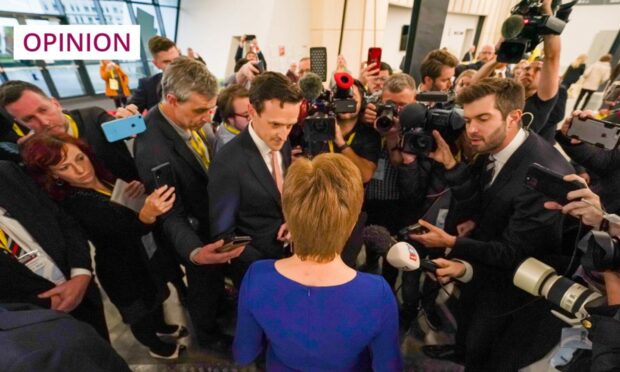In a healthy democracy, a free press should treat with scepticism bold claims made by politicians, regardless of party, writes Euan McColm.
One of the more tiresome cliches in what passes for political debate in Scotland is the claim the media thwarted victory for the Yes campaign during the 2014 independence referendum.
How, whinges the unhappy nationalist, could we be expected to win when journalists and their malign benefactors conspired against us? Thus, the independence campaigner absolves himself of any responsibility for his movement’s defeat.
Back in the mundane environs of the real world, others may take a different view. They may have the audacity to think that the Yes campaign’s failure to provide plausible answers on currency, on borders, and on the economy scuppered its ambitions. They may even believe nationalism just isn’t for some people.
As the race to succeed Nicola Sturgeon heats up, the worn old comfort blanket of media conspiracy remains loved by many nationalists.
The first SNP leadership hustings – held on Wednesday evening – kicked off with a question about what the candidates, Kate Forbes, Humza Yousaf, and Ash Regan, would do to counter the “misinformation, lies, and antipathy” aimed at the party “on a daily basis by journalists based in Scotland”.

As thunderous applause faded, all three indulged this nonsense, explaining their various strategies without once suggesting that, in a healthy democracy, a free press should treat with scepticism bold claims made by politicians, regardless of party.
But, look, I don’t expect the violins to come out because someone was mean about the press. If I had 30 pieces of silver for every time someone had accused me of taking 30 pieces of silver to attack their party, I’d long since have retired to the south of France.
You have to do the hard work, folks
If you’re a Scottish nationalist and you think the barrier to your success is the media, you’re doomed to further defeat on the constitutional question. The reason the press reported as it did on the big questions in 2014 is because neither the SNP nor the wider Yes movement had credible answers when it came to the financial foundations of an independent Scotland. You did not read reports about solutions on pensions and currency because no solutions – beyond “all will be well” – were forthcoming.
This inclination to attack the messenger rather than understanding the need to build a plausible message points to an intellectual deficiency in the SNP. Simply, you have to do the work, folks. And the work is hard.
Let’s put the answers given on Wednesday down to circumstances. Let’s assume the candidates were engaged in the perfectly noble political practise of giving the faithful what they want.
But, once elected, the next leader of the SNP will have to do a damned sight more than indulge fantasies of victimhood if they’re to advance their party’s cause.
Euan McColm is a regular columnist for various Scottish newspapers

Conversation